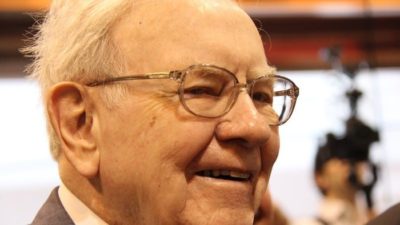Although professional fund managers tend to have a poor reputation, a few do stand out. Peter Lynch ran the US giant Fidelity Magellan Fund between 1977 and 1990. Anybody putting in $1,000 when Lynch took control would have seen the investment balloon to $28,000 by the time he retired.
The techniques that helped Lynch record the near 30% per annum return are encapsulated in his three books, the best of which is probably One Up On Wall Street.
In an interview with US broadcaster PBS, Lynch reflected on the publications: "I really wanted to help the average person. My wife and I have given all the profits from those books to charity."
Although he worked as a professional investor, Lynch certainly took the view of the "average person". As Lynch admits: "I continue to think like an amateur as frequently as possible".
Do Better Than The Experts
The reason for such an attitude is simple: "Twenty years in this business convinces me that any normal person using the customary three percent of the brain can pick stocks just as well, if not better, than the average Wall Street expert".
Lynch's approach can be summarised by "go with what you know". Rather than listen to professionals, tipsters and the rest, Lynch is a strong advocate of "do your own research":
"If you stay half alert, you can pick the spectacular performers right from your place of business or out of the neighbourhood shopping mall, and long before Wall Street discovers them. It's impossible to be a credit-card-carrying consumer without having done a lot of fundamental analysis on dozens of companies — and if you work in the industry, so much the better".
Stalking The Huge Winners
It's these "spectacular performers" that Lynch is most recognised for. Undiscovered, under-rated, but fast growing, Lynch tries to unearth potential "tenbaggers", shares that could grow ten-fold and beyond.
While those sorts of returns are traditionally seen as the reserve of fanciful and speculative issues, Lynch is careful only to get into proven companies where there's obvious scope for further profit growth:
"There are three phases to a growth company's life: the start-up phase, during which it works out the kinks in the basic business; the rapid expansion phase, during which it moves into new markets; and the mature phase, when it begins to prepare for the fact that there's no easy way to continue to expand.
Each of these phases may last for several years. The first phase is the riskiest, because the success of the enterprise isn't yet established. The second phase is the safest, and also where the most money is made, because the company is growing simply by duplicating its successful formula. The third phase is the most problematic, because the company runs into limitations. Other ways must be found to increase earnings."
Idiot-Proof Companies
So what type of company does Lynch prefer? In short, ones where there is no need for exceptional management talent and specialised investor knowledge:
"If it's a choice between owning stock in a fine company with excellent management in a highly competitive and complex industry, or a humdrum company with mediocre management in a simpleminded industry with no competition, I'd take the latter.
For one thing, it's easier to follow. During a lifetime of eating donuts and buying tyres, I've developed a feel for the product line that I'll never have with laser beams and microprocessors. "Any idiot could run this business", that's a plus as far as I'm concerned, because sooner or later any idiot probably is going to be running it."
13 Signs Of A Great Company
Lynch condensed his share picking thoughts into the thirteen favourable attributes of a company:
1. It sounds dull — or, even better, ridiculous;
2. It does something dull;
3. It does something disagreeable;
4. It's a spin-off;
5. The institutions don't own it, and the analysts don't follow it;
6. The rumours abound: It's involved with toxic waster and/or the Mafia;
7. There's something depressing about it;
8. It's a no-growth industry;
9. It's got a niche;
10. People have to keep buying it;
11. It's a user of technology;
12. The insiders are buying, and;
13. It's buying back shares.
Such criteria led him to Automatic Data Processing (payroll processing), Taco Bell (restaurants), La Quinta (motels), Cork Crown and Seal (can and bottle cap manufacturing), Seven Oaks (retail coupon processing), Safety-Kleene (waste disposal) and Service Corporation (funerals).
None of these businesses operated in high profile growth markets, yet all presented Lynch with "multibagger" returns well before Wall Street cottoned on to their growth.
As Lynch remarked:
"In a no-growth industry, especially one that's boring and upsets people, there's no problem with competition… This gives you leeway to continue to grow, to gain market."
The simplicity Lynch required in his companies was also mirrored in his valuation calculations. Nothing too complicated here:
"Find the long-term growth rate (your guess is as good as mine), add the dividend yield, and divide by the P/E ratio. Less than 1 is poor, 1.5 is okay, but what you're really looking for is a 2 or better. A company with a 15 percent growth rate, a 3 percent dividend, and a P/E of 6 would have a fabulous 3."
Never Sell At The Bottom
And the basic, common sense approach was also extended to general price movements, too:
"A price drop in a good stock is only a tragedy if you sell at that price and never buy more. To me, a price drop is an opportunity to load up on bargains from among your worst performers and your laggards that show promise.
"If you can't convince yourself "When I'm down 25 percent, I'm a buyer" and banish forever the fatal thought "When I'm down 25 percent, I'm a seller", then you'll never make a decent profit in stocks."
With the benefit of a larger domestic market, many US-based shares undoubtedly have greater scope for growth than their equivalents in Australia. That said, Lynch's approach can be easily transposed down under, and is the classic, straightforward way of selecting small, fast growing companies.








